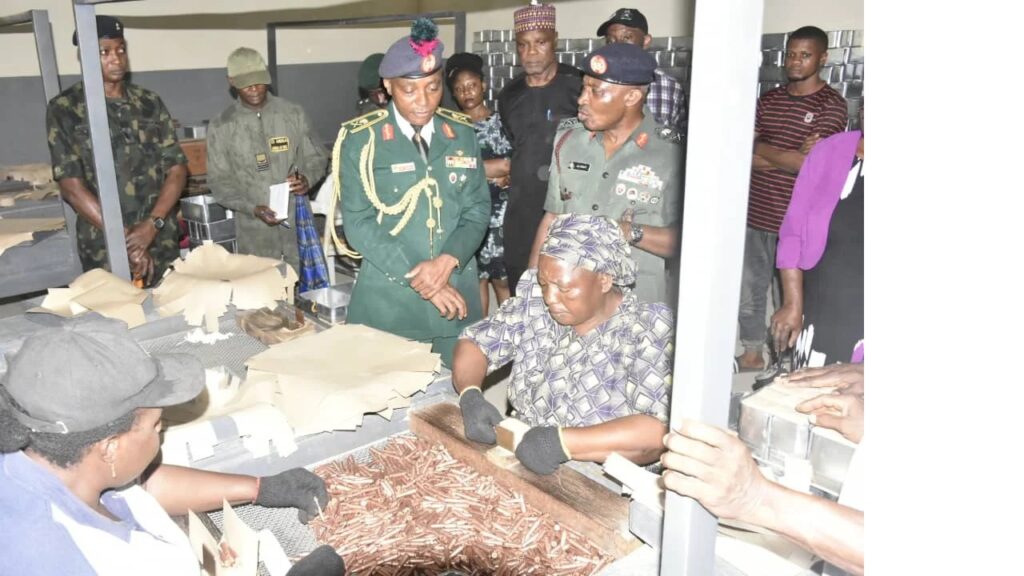
With the suspension of all programmes administered by the National Social Investment Programme Agency (NSIPA) by the Federal Government, indications have emerged that the ongoing probe of the Minister of Humanitarian Affairs and Poverty Alleviation, Betta Edu, over an alleged N585 million fraud in the ministry would birth far-reaching reforms in government’s intervention programmes targeted at the poor and vulnerable.
This is even as stakeholders have said that flaws in the leadership recruitment process in the country is the major reason corruption thrives in Nigeria to the extent that public officials entrusted with funds and materials to distribute to the poor and vulnerable would siphon them.
The stakeholders, comprising Civil Society Organisations (CSOs), religious leaders, technocrats and public affairs analysts, also told The Guardian that the failure of past administrations to tackle corruption in the fuel subsidy regime paved the way for the financial scandal in the Humanitarian Ministry, arguing that if the government had taken justice to those who perpetrated fraud in the fuel subsidy regime, there would have been no need for the removal of subsidy as well as provision of palliatives to poor Nigerians.
They maintained that corruption has eaten deep into the fabric of the nation, urging the Economic and Financial Crimes Commission (EFCC), Independent Corrupt Practices and Other Related Offences Commission (ICPC), Code of Conduct Bureau (CCB), Police and other anti-corruption agencies to seriously beam their searchlights on other Ministries, Departments and Agencies (MDAs) and ensure that those who are siphoning public funds are fished out and brought to justice.
Nevertheless, the decision of President Bola Ahmed Tinubu to suspend “all NSIPA-related activities, including but not limited to all distributions, events, payments, collaborations and registrations” may be targeted at heeding these calls.
The Secretary to the Government of the Federation (SGF), George Akume, who announced the suspension of the programmes last Friday evening, had explained that the move was further to the ongoing investigation of alleged malfeasance in the management of the agency and its programmes.
In a statement signed by a Director of Information in the office of the SGF, Segun Imohiosen, which was made available to newsmen, Akume said: “All four programmes administered by NSIPA, viz; N-Power Programme, Conditional Cash Transfer Programme, Government Enterprise and Empowerment Programme and Home Grown School Feeding Programme (the “Programmes”) have been suspended for a period of six weeks in the first instance.”
The SGF further said: “President Bola Ahmed Tinubu has also raised significant concerns regarding operational lapses and improprieties surrounding payments to the Programmes’ beneficiaries.
“He has therefore constituted a ministerial panel to conduct a thorough review of the Agency’s operations with a view to recommending necessary reforms of the NSIPA.”
In the statement, the President assured “stakeholders and all Nigerians that his administration remains committed to a swift and unbiased process that will ensure that, going forward, social intervention programmes will work exactly as intended, to the benefit of the most vulnerable Nigerians.
Notwithstanding, the Executive Director, Civil Liberties Organisation (CLO), Ibuchukwu Ezike, told The Guardian that most of the people elected and appointed into positions of trust in Nigeria are people who owe no allegiance to Nigeria, hence the penchant by some public officials to steal what is allocated to uplift the poor.
“They are nominees of like minds in the leadership of the parties or people who are close to those in government or who assisted the candidate or the party in their campaigns to win elections and the likes. So, their key mission in office is to loot and plunder Nigeria, not otherwise.
“Late Dr. Arthur Agwuncha Nwankwo, the former Vice Chairman of NADECO and Chancellor of the Eastern Mandate Union (EMU), in his locus classicus book, The Stolen Billions, described the characters of those appointed by the military to political positions in Nigeria as looters who have no stake in Nigeria. He cited the case of one former Minister of Petroleum, Alhaji Alhaji, who attended an OPEC meeting in Vienna, Austria, with $500, 000 in the 1990s. Alhaji hired a prostitute who drugged him and made away with his portfolio bag that contained all the sensitive documents for the meeting, his international passport and the $500, 000. This barbaric and greedy attitude of the military politicians is what has continued in government after 1999,” he stated
Ezike also wondered what a neophyte without character and experience would do when given a high profile position except to plunder. He noted that the clamour to give women and the youth opportunity to serve in government has become a process for “the shameless, circulating Nigerian elite to nominate their wives, children, relations, associates and girl friends without due qualifications for such offices.”
He added: “No one thinks about those who have been in the trenches fighting for a better, just and progressive society, who have been tested and proven to be good, credible, intelligent and patriotic.
“Then comes the issue of home training and godlessness. Most of the Nigerian parents in politics lack absolute regard for discipline, good behaviour and respect for the law, due process, human rights and God. Their children are trained in similar manner and when they find themselves in such offices, their major interest, like their parents, would be to steal any money they see and appropriate any opportunities they find. My people, Ndigbo, have a saying that “agwo anaghi amu ihe di mkpurisi (meaning that snakes do not produce short offspring).”
Noting that it is not impossible “to address this shame and return Nigeria to a corridor of pride, honour and happiness,” Ezike urged the government to put in place strong mechanisms or laws that frown at corruption and abuse of office.
“The anti-corrupt institutions namely, the Police, EFCC, ICPC, Code of Conduct Bureau should be made independent in truth and action, and be strengthened to be able to do their duties creditably well and without fear or favour. All those who indulge in this despicable and reprehensible practice should be severely punished to serve as a deterrent to others. Also, qualified, patriotic, honest, just, experienced and hard working Nigerians, who are all over the world, should be considered for sensitive and important positions so that they can deliver and become the signposts for credible, transparent and good governance. And lastly, our judicial system must sit up, be truly independent, clean and rigid in dealing with corruption cases to ensure that justice is adequately dispensed,” he stressed.
Speaking in the same vein, President of The Credibility Group, Chief Goddy Uwazurike, noted that the ‘victory first, morality later’ mentality of Nigerian politicians robs off on appointments into public offices, hence the large scale corruption in the public sector.
His words: “The failure of recruitment is an expression in human resources. This is where a team will have an objective, a destination. But in public affairs under the control of politicians, the motto is ‘victory first, morality later.’ In the race for victory, morality has no place. Any leader of a political party who does not understand that has a big mountain in front of him.
“In achieving victory, a Nigerian political party leader will grab victory and dare you to go to court, knowing very well that the electoral body will never supply the certified true copies of the election details. And of course, the electoral body will suffer no consequences for unconstitutional conduct.
“So, the party gathers the people who will make victory certain. In the end, the dubious people get appointments while the honest people are stranded.”
On the way out of the quagmire, he said: “What can be done is a tall order. In a sentence, every vote must count. The process of making votes count begins with appointments into the electoral body and the judiciary. I grew up seeing the judiciary as the last hope of the common man. As an adult and a lawyer, I know that justice is a rare commodity.”
Travel Technology Consultant, Clara Chinwe Okoro, also noted that appointments made by any government on the basis of political party, without taking into cognizance the issue of integrity and capability of the individuals in question is likely to throw up the kind of situation the government is dealing with currently.
“And then again, I believe ethics and accountability isn’t a very strong priority for this government.
“The judiciary would have been recourse for justice on behalf of the citizens in cases like these but we know that it is almost impossible with the antecedents of what we have witnessed lately. When we take the pedigree of public servants seriously, then the solution will come,” she said.
For former Catholic Archbishop of Abuja, John Cardinal Onaiyekan, the Federal Government to stop chasing shadows and muster the political will to tackle corruption.
He noted: “The root cause of our predicament is corruption. If we had sincerely tackled corruption in the fuel subsidy regime, there would have been no need to remove it, and there would have been no need for palliatives nor rampant poverty; we should stop chasing shadows
On his part, the Anglican Archbishop of Enugu, Most Reverend Emmanuel Chukwuma, has described the financial scandals in the Humanitarian Ministry as unfortunate, lamenting that corruption has reared its ugly head early in the life of the current administration.
Chukwuma said: “It’s unfortunate that this issue of corruption is happening within five months of this administration and that shows that the ministers should be properly watched. We had serious corruption during the last regime and no investigation was done against the offenders. The people who recommended Betta Edu should be blamed because they did it on selfish grounds. The President should beam more searchlights on all the ministries. The National Assembly is not free from all these corruption because there was never a proper scrutinisation of those appointed ministers. They are also corrupt.
“The President should be more sincere in fighting corruption to save this nation because there is money in this country but it is going into the wrong hands.
They should repent. The ministers are doing what they are doing because of greediness, lack of contentment and insincerity. Politicians without good business and good background should not be appointed into office. There should be honest and serious screening of anyone to be appointed.”
Also, the Archbishop, Catholic Archdiocese of Lagos, His Grace, Most Reverend Alfred Adewale Martins, described the alleged fraud in the Ministry of Humanitarian Affairs as very disappointing, lamenting that it was not the first time.
Martins said: “It is very disappointing that the immediate past minister and present minister have been enmeshed in allegations of corruption. It is disappointing, especially because their ministry has been entrusted with bringing relief to the most deprived people in the country. It is a betrayal of trust and confidence and in many ways it speaks to the fact that the intervention programmes don’t seem to be adequately thought through in a way that will make a difference to the immediate people in this country.
“In the first instance, the process of gathering data that the ministry is supposed to use in giving intervention; it is difficult to see how it can be done in a transparent way without any shadow of doubt. The process of gathering data and eventually making the intervention have not had the kind of transparency that is needed and so corruption can easily creep in into the system. And apart from that, I believe intervention that gives N20,000 and N30,000 to individuals and the rest of it, however useful it may be, doesn’t really address the basic problems of empowering people in terms of education, provision of social amenities and many other areas. I think these are the problems I found with the intervention that the government has been making through this poverty alleviation and so on.
“These people who ‘rob’ the country and the masses, I see it as a kind disposition that people seem to have when they are entrusted with public offices; that it is their own opportunity to grab as much as possible. They see it as their own opportunity to create wealth for themselves and their immediate families knowing very well that in the end not much is going to happen to them. And indeed, many times, nothing happens. In other words, the impunity with which people have carried out this act over the years have made people to be so bold as to continue to do it because they know that there are no consequences. After some time there is public outcry, and everything dies down and everybody forgets. That is what I think gives them the boldness to continue unabated in our country.
“So, to get it right, I think that it is necessary to think through how the intervention will actually make the difference; think it through in such a way that whatever obstacle might be on the way would be addressed even before it begins. Then, of course, the ethics that guide people in their work also needs to be re-jigged because everybody is all about how much I can get from public funds. Maybe there are some who are not like that. Until the government’s action is taken to a logical conclusion, until people are brought to book for what they do wrong, until those things are done, I’m afraid we will still continue in this way.” Nigerian filmmaker and Chief Executive Officer (CEO) at Colobarmedia 707, John Njamah, said the Nigerian system was embedded in corruption.
“This is not the way to go as a country. If you give birth to children and you have questionable character, there is every tendency that the children will emulate you.
“Corruption has eaten deep into the fabric of our society. What we have are political appointees who act with impunity and mess up the system. No decorum whatsoever. It is very unfortunate the situation we are in as a country.
“There should be a total overhaul of the system because it is in shambles. The people we have there are recycled political holders. Things have to change,” Njamah added.
Chairman, Human and Environmental Development Agenda (HEDA), Lanre Suraj, said it is high time Nigerians sat tight and did anything humanly possible to kill corruption in the system before it brings the country down.
Suraj warned that the spate at which corruption is going, and the impunity with which the perpetrators were doing it, calls for a serious concern among Nigerians He said the Betta Edu case further shows the abject weakness of government institutions, which include also the security agencies and judiciary.
Suraj urged the government to ensure that those culpable are made to face the music. He said one of the reasons people get involved in corruption with impunity is because those found guilty are not severely punished.
“You can imagine someone who is charged and sentenced for graft but the same person is asked to enter plea bargaining, which means he/she would release part of what he mismanaged and by interpretation keeps the rest.
“This has emboldened civil servants to get involved in corruption with impunity,” he said. Suraj suggested that institutions like EFCC, ICPC, Code of Conduct Bureau and Code of Conduct Tribunal be made stronger and independent.
“If public officers do not declare their assets publicly before and after their election and or appointments, it will be difficult to fight corruption. We should know the value of a public servant before and after his tenure in office so that nobody will use public funds to enrich himself. We also need to empower the security agencies as well as the judiciary,” he added.
He said more searchlights must be beamed on corruption at the state level, alleging that corruption at that level could triple what obtains at the federal level.












